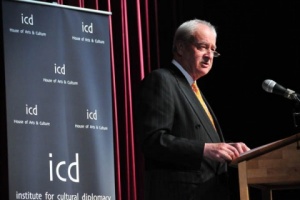Hon. Alan Ferguson
Cultural Diplomacy in the Contemporary World By the ICD Advisory Board Member the Hon. Alan Ferguson (Former President of the Australian Senate; Former Senator from South Australia)
Many commentators believe that the importance of cultural diplomacy has diminished with the fall of the Berlin wall, and a new era of relationships between East and West. Nothing could be further from the truth.
While there is no doubt that post World War II and the Cold War period presented the greatest opportunity for cultural diplomacy, particularly between the West and the Communist bloc, modern communications and technology have opened up a whole new world of opportunities. The development and the comparative low cost of new technology are making possible much higher levels of communication and information exchange via the internet, satellites, cable networks and other technological breakthroughs.
Traditional diplomacy has been described as the defined interaction of states between diplomats alone, or as ‘ the conduct of relations between sovereign states through their accredited representatives ‘.Some would regard this as an elite system for a few. On the other hand, public and cultural diplomacy is the method used by nations to explain themselves to the world, and includes the use of cultural expression and exchanges of ideas and information to increase mutual understanding to the masses.
Even through the darkest days of the Cold War, American jazz musician played to audiences in the Soviet Union, Rudolph Nureyev performed throughout the United States and the first tentative efforts to develop diplomatic ties with Communist China started with table tennis!
The past 20 years since the fall of the Berlin Wall has seen many changes in attitudes and cultural thinking. Today we are more likely to hear people speak of ‘Asian culture’, ‘European culture’ or ‘Muslim culture’. There has been a revival of ‘local’ cultures and languages and the breakup of former countries into smaller independent countries where differing cultural backgrounds has often been the driving force.
These events provide fertile ground for an increasing emphasis on the promotion of international goodwill and understanding through cultural diplomacy - it’s need is just as great in our contemporary world as it has been in the past.
